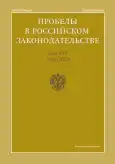Methodological Aspects of the Development of a Legal Model of Sustainable Corporate Governance: to the Formulation of the Question
- Authors: Petrova A.V.1
-
Affiliations:
- Gazprom Social Initiatives Foundation
- Issue: Vol 16, No 8 (2023)
- Pages: 119-125
- Section: Private Law (Civil) Sciences
- URL: https://bakhtiniada.ru/2072-3164/article/view/251405
- EDN: https://elibrary.ru/PXJPCA
- ID: 251405
Cite item
Abstract
The global trend in the implementation of sustainable development goals and ESG transformation poses a methodologically difficult task of developing a national legal model of sustainable corporate governance. The article considers: its necessity and possibility, the domestic tradition of legal modeling, including in the field of management, the problem of using foreign, primarily Western, experience in modern conditions, the desire of business to innovate in this area. The key methodological problem of determining the degree and adequacy of state intervention in corporate relations is highlighted: justifying the need for legal regulation of sustainable corporate governance, or leaving it in the area of soft regulation, considering it an internal affair of corporations. Taking into account the peculiarities of the current situation, in which the economy is working under the pressure of sanctions and external circumstances, the development of the desired model may not seem relevant and premature. In this context, the publication is focused on raising, updating, the question.
Full Text
##article.viewOnOriginalSite##About the authors
Alina V. Petrova
Gazprom Social Initiatives Foundation
Author for correspondence.
Email: petrova.av@socialfondgaz.ru
Deputy Director on Legal and Material Relations
Russian Federation, MoscowReferences
- Barkov A.V. On the application of the method of legal modeling in civil dissertations// Methodological problems of civil studies: Sat. sci. articles. Yearbook. Issue 2. 2017/ Ed. A.V. Gabov, V.G. Golubtsov, O.A. Kuznetsova. M.: Statute, 2017. 424 p.
- Bezrukov A.S. The legal model as a tool of legal science and practice: diss. ... cand. jurid. sciences': 12.00.01. Vladimir. 2008.
- Berkumbaev N. S. The concept of sustainable development in Russian corporate law// Issues of Russian justice. 2022. No. 19. pp. 97-111.
- Glinsky B.A., Gryaznov B.S., Dynin B.S., Nikitin E.P. Modeling as a method of scientific research (epistemological analysis). Moscow: Publishing House of Moscow State University. 1965.
- Gorshunov D.N. Mathematical methods in the study of the system of law// Scientific Notes of Kazan State University. Series "Humanities". Vol. 150. Book 5. 2008. pp. 27-34.
- Grishina Ya. S. Conceptual model of legal support of Russian social entrepreneurship: diss. ...Dr. yurid. sciences': 12.00.03. M., 2016.
- Degtyarev M.V. Modeling in law// Bulletin of Perm University. Legal sciences. 2021. No.53. pp. 436-461.
- Declaration "Transforming our World: the 2030 Agenda for Sustainable Development", adopted by the UN General Assembly resolution of September 25, 2015. https://unctad.org/system/files/official-document/ares70d1_ru.pdf.
- The report "Our common future". UN International Commission on Environment and Development, 1987 (. Our Common Future / Brundtland Report. United Nations World Commission on Environment and Development, 1987).
- The Law of the USSR of February 11, 1957 "On attribution to the jurisdiction of the Union Republics of legislation on the structure of the courts of the Union Republics"// Vedomosti of the Supreme Soviet of the USSR. 1957. No. 4. Art. 80.
- Koni A.F. Judicial reform and jury trial// Selected works and speeches. Tula, "Autograph", 2000.
- Corporate governance in the context of ESG: a new understanding of sustainability. M., 2021.
- Levillen K. Business mission. Forms, models and consequences of a collective obligation. ParisTech Ph.D. 2015 (fr.)
- Scientific foundations of Soviet law-making/ ed. by R. O. Khalfin. M.: Nauka, 1981. 317 p.
- Petrov A.A. Fundamentals of the legislation of the USSR and the Union republics in the context of the development of the idea of formal priority of codified acts// Leningrad Law Journal. 2016. No.2 (44). pp. 19-27.
- Ponkin I. V., Lapteva A. I. Methodology of scientific research and applied analytics: textbook / Consortium "Analytics. Right. Figure". 2nd ed., add. and reprint. M.: Buki Vedi, 2021. 567 p.
- The UN Framework Convention on Climate Change. Adopted by the 21st session of the Conference of the Parties. Signed on behalf of the Russian Federation in New York on April 22, 2016/ UN https://www.un.org/ru/climatechange/paris-agreement
- Rudashevsky V.D. Law and modeling// Methodological problems of Soviet legal science. M.: Nauka. 1980.
- Rubinstein B.M. Soviet economic and civil law. Moscow: OGIZ, 1936.
- Savina T. N. Formation of a socially-oriented market economy from the standpoint of ensuring national economic security (opportunities, problems, prospects): monograph. Saransk: Print-Izdat, 2014. 190 p.
- Federal Law "On Strategic Planning in the Russian Federation" dated 06/28/2014 No. 172-FZ (ed. dated February 17, 2023) // Collection of Legislation of the Russian Federation dated June 30, 2014 No. 26 (Part I) Article 3378.
- Coase, Ronald. The Problem of Social Cost// Journal of Law and Economics. 1960. Vol. 3. №1. Рp. 1-44.
- Estrin S., Wright M. Corporate Governance in Former Soviet Union: An Overview// Journal of Comparative Economics. 1999. Vol. 27. Pp. 398−421.
- Hassan Ahmed Shirwa, Murat Onuk Corporate Governance Models and the Possibility of Future Convergence// Journal of Corporate Governance Research. 2020. October 2020 №4(1):18.
Supplementary files








